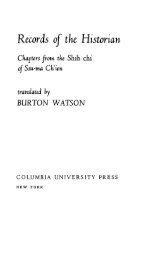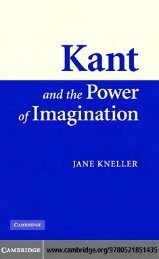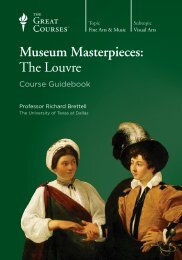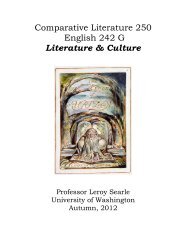Ellipsis of Battle.pdf - University of Washington
Ellipsis of Battle.pdf - University of Washington
Ellipsis of Battle.pdf - University of Washington
You also want an ePaper? Increase the reach of your titles
YUMPU automatically turns print PDFs into web optimized ePapers that Google loves.
30<br />
Journal <strong>of</strong> the American Oriental Society 95.1 (1975)<br />
sion <strong>of</strong> feelings against the war. Other singers in<br />
the Shih Ching tradition reveal their grievance in<br />
a subtle way. Confucius finds that a standard<br />
Shih Ching poem "expresses grief without doing<br />
injury." (Analects III 20).<br />
To express grief with restraint but effectively,<br />
the poet turns to the use <strong>of</strong> contrast and juxta-<br />
position. He contrasts the past and the present<br />
to suggest the mutability <strong>of</strong> life; and he juxtaposes<br />
the place there and here specifically to underline<br />
a soldier's migratory life. In so doing, the grief is<br />
delineated, but the actual battle is avoided.<br />
There is no poem in the corpus <strong>of</strong> Shih Ching<br />
that permits the reader to witness the clash <strong>of</strong><br />
arms. As most <strong>of</strong> the complaints are uttered by<br />
the trooper in first person, the singer always seems<br />
to have a strong consciousness to conceal the<br />
brutality <strong>of</strong> the battle, keeping it to himself.31 The<br />
soldier <strong>of</strong> poem 167, for example, puts stress on<br />
the passage <strong>of</strong> time to show his desire to leave the<br />
frontier for home. The passage <strong>of</strong> time is indicated<br />
with reference to nature. In the first three stanzas,<br />
he observes the development <strong>of</strong> the fern, sprouting,<br />
tender, and finally growing hard-time passes<br />
swiftly in the poem. The cry "Return, return I"<br />
is desperate and resounding in the three incre-<br />
mental stanzas. As a private soldier, he nearly<br />
resorts to cursing when he realizes that the <strong>of</strong>ficer's<br />
horse constantly threatens him on the march.32<br />
The experience is then summarized in the con-<br />
cluding stanza:<br />
Long ago when I was taking <strong>of</strong>f,<br />
The willows were dangling in green:<br />
Now as I am coming back<br />
It is wet, the snowflakes flying.<br />
Dragging along the endless road,<br />
I am thirsty and hungry.<br />
My heart is painful and anguished,<br />
But no one knows how I have suffered.<br />
The contrast <strong>of</strong> the past and the present is evident<br />
here. Again, the emotive words in the last lines<br />
31 In this case the T'ang poet Ts'en Shen departs from<br />
the classical tradition in the treatment <strong>of</strong> war. The<br />
bloody scenes in his poetry seem meant to horrify his<br />
readers back in Ch' ang-an. One <strong>of</strong> the reasons may likely<br />
be that Ts'en is not a combat <strong>of</strong>ficer, but a judicial clerk<br />
in the army. Writing from imagination is certainly dif-<br />
ferent in focus from singing out <strong>of</strong> experience.<br />
32 Cf. the similar situation in Xenophon, Anabasis III.<br />
4: Soteridas, a man from Sicyon said, "We are not on a<br />
level, Xenophon. You are riding on horseback, while<br />
I am wearing myself out with a shield to carry."<br />
are prepared by the description <strong>of</strong> nature's change,<br />
all the way to the winter <strong>of</strong> increasing misery.<br />
The emotion is conjured up, but the battle remains<br />
elided. This technique is also found in poem 168,<br />
where the formulaic pattern "Long ago when I<br />
was taking <strong>of</strong>f . . . Now as I am coming back"<br />
is utilized to denote the similar emotion by con-<br />
trast. It is, furthermore, the basic pattern that<br />
is repeated to open each <strong>of</strong> the four stanzas<br />
throughout poem 156.<br />
I went to the east mountains -<br />
Long it was that I did not return.<br />
Now that I am coming back from the east,<br />
It drizzles all over.<br />
I longed to return when I was in the east,<br />
But now my heart is sad for the west.<br />
She once made me many clothes, and thought<br />
That I would never be gone with the troops.<br />
When the worms started to writhe<br />
Teeming in the mulberry field,<br />
Alone, I slept through the nights<br />
Once and again under the cart on the field.<br />
I went to the east mountains -<br />
Long it was that I did not return.<br />
Now that I am coming back from the east,<br />
It drizzles all over.<br />
The fruit <strong>of</strong> the bryony has spread,<br />
Hanging down from the eaves <strong>of</strong> my house.<br />
Sowbugs live in the room:<br />
Spiders' webs blocked the door.<br />
My paddock has turned into a deerfield,<br />
And the glow-worms move in dark.<br />
These are things to be afraid <strong>of</strong>,<br />
Indeed, and things to love.<br />
I went to the east mountains -<br />
Long it was that I did not return.<br />
Now that I am coming back from the east,<br />
It drizzles all over.<br />
A stork cried on the ant-hill;<br />
The wife sighed in her room.<br />
She sprinkled and swept the empty house,<br />
For I was coming back from the war.<br />
The bitter melons have piled up,<br />
Many <strong>of</strong> them, on top <strong>of</strong> the firewood I cut.<br />
Since I last saw them<br />
Till now, it is three years I<br />
I went to the east mountains -<br />
Long it was that I did not return.<br />
Now that I am coming back from the east,<br />
It drizzles all over.







